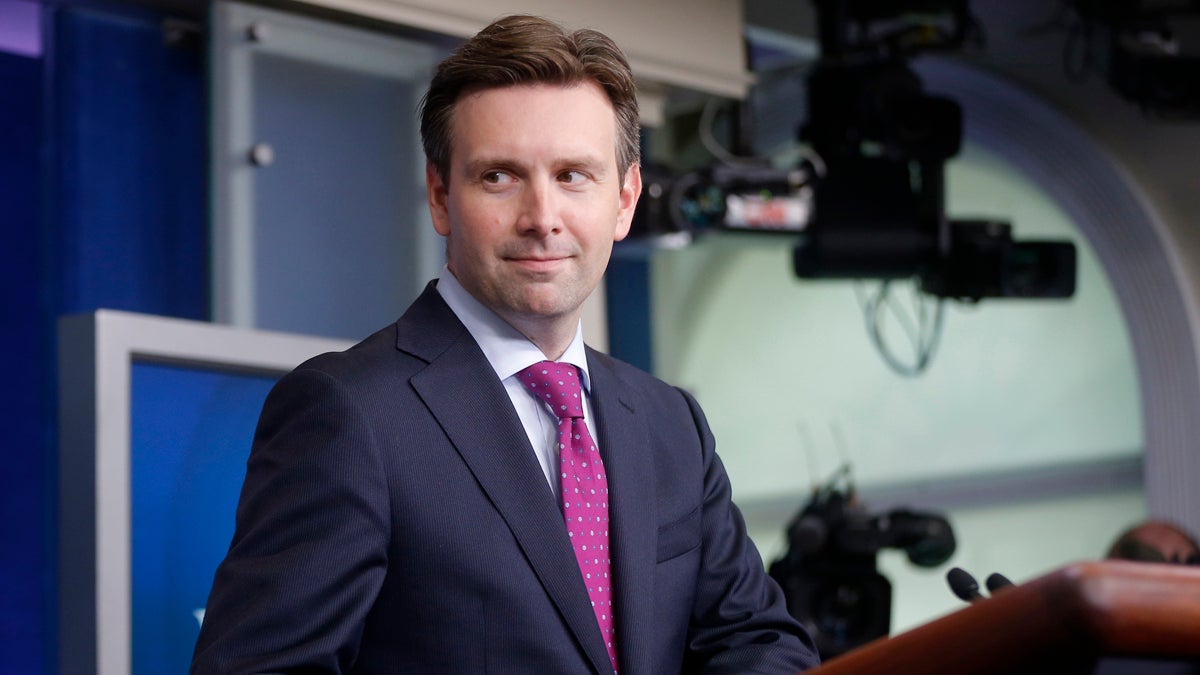Obama spokesman whines hypocritically about ‘anonymous sources’

White House press secretary Josh Earnest is shown taking the podium for a daily press briefing at the White House. (AP Photo/Charles Dharapak, file)
Timing is everything, in writing as in life. And as luck would have it, my column early yesterday — about the Obama team’s ill treatment of the press — turned out to be fortuitous.
The ill treatment is bad enough. What’s worse is the hypocrisy.
In a briefing yesterday afternoon, Obama press secretary Josh Earnest attacked a new Washington Post story that had clearly embarrassed the White House. According to the story, Obama officials were warned a year ago about an impending surge of Central American minors crossing the border. Earnest was incensed about this sentence: “The administration did too little to heed those warnings, according to interviews with former government officials, outside experts and immigrant advocates, leading to an inadequate response that contributed to this summer’s escalating crisis.”
Earnest was upset that the story contained “anonymous sources.” He said the story gave too much “weight” to the sources who had declined to be named. Therefore, he implied, the story was wrong. He then gave reporters some advice on how to properly do their job – as if he was their editor: “If you have anonymous sources at the White House who are telling you something, and you’re going to say to them, that anonymous source, ‘Look, I’m going to give your side of the story a little less weight right now because you’re telling me this anonymously.’ That would be an entirely credible thing for you to do.”
Never mind that Earnest failed to refute the damning thrust of the Post story. Never mind that the thrust of the story was a damning 41-page report sent to the Department of Homeland Security, and that the report’s chief author – Victor Manjarrez Jr., a former Border Patrol station chief – was named and quoted. The real issue yesterday was obvious to all the reporters at the briefing. One scribe said it best:
“You criticize anonymous sources, but we have anonymous sources from (the White House) every day.”
There you go.
Just like virtually every other administration, this administration whines about anonymous sources in stories it deems to be negative – yet it routinely uses its own anonymous sources to promote stories that the administration wants. Sometimes Obama officials will surreptitiously leak stuff; more often, they’ll simply talk anonymously to the press for no particular reason. Yesterday afternoon, for instance, they set up a conference call with reporters to talk about job training – and the deal was, the White House sources had to remain anonymous.
The reporters peppered Earnest about that: “So, Josh, would you commit, then, when you have situations like today’s call – which is people picked specifically by the White House to roll out a policy of the White House – would you commit to having those people speak on the record?” No, Josh refused to commit.
To fully grasp the absurdity of the White House’s whine about the Post story, here’s a random sampling of the White House’s use of anonymous sources – just from the last week of August 2013: The phrase “a senior administration official” showed up eight times in national news stories, and “a senior Obama administration official” showed up twice. Another random example: in March of this year, CNN’s Jake Tapper did a story citing “unidentified White House sources.” Rest assured, the Obama team didn’t complain about its own use of anonymity.
And earlier this month, the Society of Professional Journalists sent a letter to Obama, complaining in part about the administration’s flagrant use of anonymous sources. (I mentioned this letter yesterday, in a different context.) A key passage in the letter: “When public affairs officers speak, even about routine public matters, they often do so confidentially, in spite of having the title ‘spokesperson.'” Another key passage, about a routine practice in Obama’s bureaucracy: Agencies hold press conferences “with unnamed officials on a not-for-attribution basis.”
But the top prize is a 2009 Washington Post story, where Obama officials lauded their own anti-terrorism policies. Consider how weird this was. They were bragging about themselves, in a story that cast them in a positive light – yet they still insisted on being anonymous sources. Hence the litany of peek-a-boos: “a senior administration official said…senior Obama officials stressed…aides said…officials said…” and a dozen more.
Just like any other administration, the Obama administration (which had promised to be better than its predecessors) wants to have it both ways. It wants to leak and orchestrate coverage from a cloak of anonymity – while condemning the practice when the press writes stories that it doesn’t like. Indeed, given the administration’s internal policing of its employes (detailed here yesterday), it’s understandable that journalists have so frequently sought to protect their sources’ identities.
So I doubt the White House press corps will take Earnest’s advice on how they should write their stories – assigning scant “weight” to their own anonymous sources, but of course giving great “weight” to the administration’s anonymous sources. Nah, they won’t go for that. They don’t work for him.
——-
Follow me on Twitter, @dickpolman1, and on Facebook.
WHYY is your source for fact-based, in-depth journalism and information. As a nonprofit organization, we rely on financial support from readers like you. Please give today.

